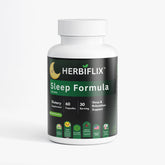Can Berberine Improve Your Sleep? Unlocking the Metabolic Link
Can Berberine Improve Your Sleep? Unlocking the Metabolic Link
In our fast-paced world, a good night's sleep often feels like a luxury rather than a necessity. Millions struggle with restless nights, tossing and turning, or waking up feeling unrefreshed. While conventional advice often points to sleep hygiene, diet, and stress management, emerging research suggests a deeper, more intrinsic connection: the link between our metabolic health and the quality of our sleep. Could a powerful natural compound called Berberine hold a key to unlocking more restful nights by addressing this metabolic imbalance?
At Herbiflix, we're dedicated to exploring the scientific frontiers of natural wellness. Today, we delve into how Berberine, renowned for its profound impact on metabolic function, might indirectly contribute to better sleep. It's not a sleep aid in the traditional sense, but its benefits for foundational health could pave the way for more consistent, restorative rest.
What is Berberine? A Pillar of Metabolic Health
Berberine is a bioactive compound extracted from several plants, including Berberis aristata (Indian Barberry), goldenseal, and Oregon grape. For centuries, it has been a staple in traditional Chinese and Ayurvedic medicine, primarily valued for its anti-inflammatory and antimicrobial properties. In recent decades, modern science has validated many of these traditional uses, particularly highlighting its significant role in supporting metabolic health.
Studies have shown Berberine's ability to activate AMP-activated protein kinase (AMPK), often dubbed the "master regulator" of metabolism. This activation has a cascade of beneficial effects, including helping to regulate blood sugar support, improve insulin sensitivity, reduce cholesterol levels, and promote a healthy gut microbiome. These well-established metabolic actions form the basis of its potential, indirect influence on sleep.
The Intricate Dance Between Metabolism and Sleep Quality
Before we explore Berberine's role, it's crucial to understand why metabolic health is so intertwined with sleep. Poor metabolic health, often characterized by unstable blood sugar levels, insulin resistance, and chronic inflammation, can severely disrupt our natural sleep cycles:
- Blood Sugar Fluctuations: If your blood sugar drops too low during the night (hypoglycemia) or spikes too high (hyperglycemia), your body responds by releasing stress hormones like cortisol and adrenaline, which can wake you up or prevent deep sleep.
- Inflammation: Chronic low-grade inflammation, a hallmark of metabolic dysfunction, can interfere with the production of sleep-regulating hormones and neurotransmitters, leading to fragmented sleep and fatigue.
- Hormonal Imbalance: Insulin resistance can throw off other hormones that influence sleep, such as melatonin (the sleep hormone) and cortisol (the stress hormone), disrupting your circadian rhythm.
- Weight Management: Metabolic issues often correlate with weight gain, which can exacerbate sleep apnea and other sleep-disordered breathing conditions.
In essence, if your metabolism isn't functioning optimally, your body is in a state of subtle distress, making it challenging to achieve truly restful sleep.
How Berberine Might Influence Sleep: Unpacking the Mechanisms
While Berberine isn't a direct sedative, its profound effects on metabolic pathways suggest several ways it could indirectly foster better sleep:
- Stabilizing Blood Sugar Levels: By helping to regulate glucose metabolism, Berberine can reduce the nocturnal spikes and dips in blood sugar that often disrupt sleep. More stable blood sugar support throughout the night means fewer stress hormone surges and a more consistent sleep state.
- Reducing Inflammation: Berberine possesses significant anti-inflammatory properties. By calming systemic inflammation, it may help alleviate one of the underlying physiological stressors that contribute to poor sleep quality.
- Supporting Gut Microbiome Health: Emerging research highlights the "gut-brain axis" and its critical role in sleep. A healthy gut microbiome is essential for producing neurotransmitters like serotonin, a precursor to melatonin. Berberine's positive impact on gut flora could therefore indirectly support the body's natural sleep-wake cycle.
- Indirect Stress Reduction: By improving overall metabolic function and reducing physiological stressors, Berberine may contribute to a more balanced internal environment, which is conducive to relaxation and sleep. Less metabolic stress often equates to less overall stress on the body.
Integrating Berberine into Your Wellness Routine
It's important to view Berberine as a foundational supplement for overall metabolic health, which in turn creates a more favorable environment for sleep. It's not a quick fix for insomnia, but rather a long-term strategy for supporting the physiological processes that underpin healthy sleep.
When considering a Berberine supplement, quality and purity are paramount. For those looking to support their metabolic health and potentially improve their sleep quality through this metabolic link, we recommend exploring high-quality options like Herbiflix Berberine HCL 1200mg. Our premium berberine supplement is formulated for maximum efficacy, providing robust blood sugar support and promoting overall wellness.
Beyond Berberine: A Holistic Approach to Restful Sleep
While Berberine offers promising support, it's crucial to remember that it's part of a broader holistic approach to sleep. Combining its metabolic benefits with established sleep hygiene practices is key:
- Maintain a consistent sleep schedule.
- Create a dark, cool, and quiet sleep environment.
- Limit screen time before bed.
- Incorporate regular physical activity.
- Manage stress through practices like meditation or yoga.
- Eat a balanced diet, avoiding heavy meals or excessive caffeine/alcohol close to bedtime.
Conclusion
The quest for better sleep often leads us down many paths. By understanding the profound connection between our metabolic health and sleep quality, we can begin to appreciate the potential of compounds like Berberine. While not a direct sedative, its well-documented ability to provide robust blood sugar support and improve overall metabolic health offers a compelling, indirect pathway to more restorative rest. By addressing the root metabolic imbalances, Berberine may help your body create the optimal conditions for the deep, rejuvenating sleep you deserve. Explore the power of nature with Herbiflix and take a step towards a healthier, well-rested you.





